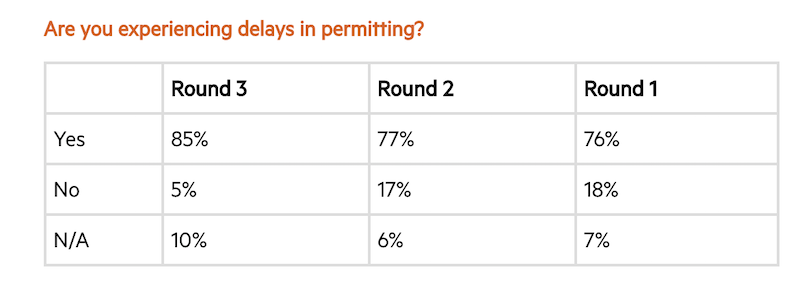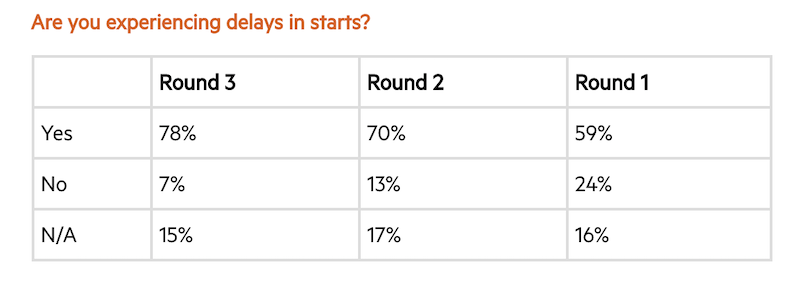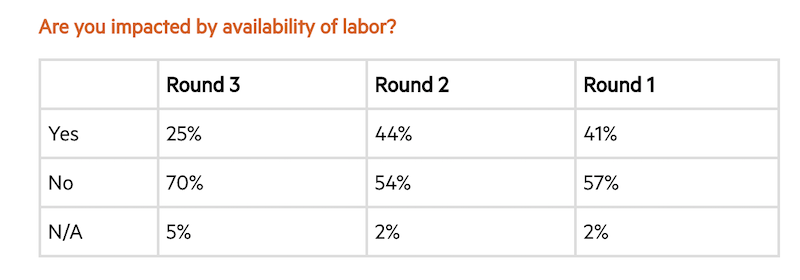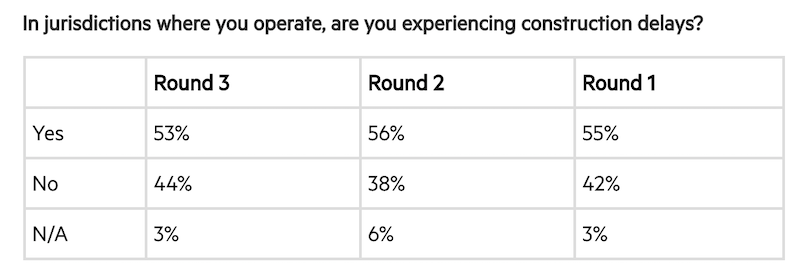More than half (53%) of multifamily developer respondents reported construction delays in the jurisdictions where they operate, according to the third edition of the National Multifamily Housing Council (NMHC) COVID-19 Construction Survey. Of this group, 85% reported delays in permitting due to COVID-19, up from 77% in round two (conducted April 9-14) and 76% in the initial survey (conducted March 27-April 1).
 Getting permits is a major problem for multifamily developers and construction firms, says the NMHC in its latest survey.
Getting permits is a major problem for multifamily developers and construction firms, says the NMHC in its latest survey.
Survey respondents reporting construction delays also indicated a significant pause in starts, with 78% reporting delays, up 8 percentage points from the end of last month, and 19 percentage points from the first round.
 More than three-quarters of multifamily developers said continue to face delays in starts, says the latest NMHC survey.
More than three-quarters of multifamily developers said continue to face delays in starts, says the latest NMHC survey.
The NMHC Construction Survey is intended to gauge the magnitude of the disruption caused by the COVID-19 outbreak on multifamily construction. Additional findings include:
• 53% of developers reported a delay in construction. Of those developers, the percentage experiencing a delay in construction because of construction moratorium dropped from 62% in round one to 37% in round three, indicating that construction activity is resuming as states relax pandemic-related restrictions.
• Only 29% of respondents reported being impacted by a lack of materials, but the percentage of respondents experiencing price increases in materials jumped to 17%, from 5% in round one and 4% in round two. Despite this jump, 78% still report no price impact, and 24% of those implementing new strategies report they are sourcing alternative building materials, up 8 percentage points from the first survey.
 Labor availability seems to be less of a problem for multifamily construction firms, says the NMHC survey.
Labor availability seems to be less of a problem for multifamily construction firms, says the NMHC survey.
• Labor availability has also improved over the course of the three surveys. Seventy percent of respondents said they were not impacted by labor shortages, up from 54% in round one and 57% in round two. This may be due in part to the fact that 24% of those implementing new strategies said they were offering workforce incentives or other benefits, up from 16% in round two.
Firms continue to innovate in the face of challenges posed by the outbreak. Fifty-nine percent of respondents indicated they have implemented new strategies to deal with the hurdles established by the virus’s continued presence. This is down from 75% in the last round and 73% in the first round. Many firms said they have implemented more than one strategy.
View the full survey results here and a comprehensive overview of the results here.
Additional resources, data, and materials from NMHC can be found here.
Related Stories
| Aug 11, 2010
CityCenter Takes Experience Design To New Heights
It's early June, in Las Vegas, which means it's very hot, and I am coming to the end of a hardhat tour of the $9.2 billion CityCenter development, a tour that began in the air-conditioned comfort of the project's immense sales center just off the famed Las Vegas Strip and ended on a rooftop overlooking the largest privately funded development in the U.
| Aug 11, 2010
Giants 300 Multifamily Report
Multifamily housing starts dropped to 100,000 in April—the lowest level in several decades—due to still-worsening conditions in the apartment market. Nonetheless, the April total is below trend, so starts will move progressively back to a still-depressed 150,000-unit pace by late next year.
| Aug 11, 2010
The softer side of Sears
Built in 1928 as a shining Art Deco beacon for the upper Midwest, the Sears building in Minneapolis—with its 16-story central tower, department store, catalog center, and warehouse—served customers throughout the Twin Cities area for more than 65 years. But as nearby neighborhoods deteriorated and the catalog operation was shut down, by 1994 the once-grand structure was reduced to ...
| Aug 11, 2010
Gold Award: Westin Book Cadillac Hotel & Condominiums Detroit, Mich.
“From eyesore to icon.” That's how Reconstruction Awards judge K. Nam Shiu so concisely described the restoration effort that turned the decimated Book Cadillac Hotel into a modern hotel and condo development. The tallest hotel in the world when it opened in 1924, the 32-story Renaissance Revival structure was revered as a jewel in the then-bustling Motor City.







